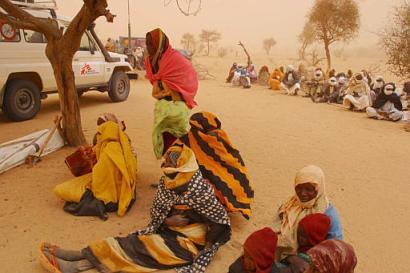Agencies warn of drastic decline in humanitarian conditions in Darfur

NAIROBI, April 28, 2004 (dpa) — Drastically raised levels of malnutrition and outbreaks of measles are threatening the displaced population in Sudan’s western Darfur region, with children being most at risk, aid agencies say.
The aid organization Médecins Sans Frontières (MSF) said in a statement Wednesday it had vaccinated 15,000 children against measles, but also had to treat hundreds of children who already caught the disease.
Measles first affects children weakened by poor nutrition, and complications from the highly contagious disease can be fatal.
The World Health Organization (WHO) has warned that with the onset of the rainy season in May, malaria outbreaks and acute diarrhoea will be real threats to the displaced.
WHO also said that with widespread reports of rape, women’s reproductive, sexual and mental health is severely at risk.
The World Food Programme (WFP) on Wednesday called the humanitarian conditions in Darfur “extremely serious”.
WFP spokeswoman Laura Melo said in Khartoum that as people in Darfur will miss the May planting season, they will be dependent on food aid for at least a year.
“If we don’t get urgent response we could be facing a catastrophe”, she said.
The U.N recently appealed for 115 million USD to help the needy population in Darfur.
All three organizations say that current levels of relief are insufficient. Since the conflict in Darfur started over a year ago, more than 1.2 million people have been affected. At least 750,000 are believed to be displaced within Darfur, while over 100,000 have fled over the border to Chad.
According to WHO, many of the displaced have gathered around towns where water is scarce, shelter and sanitation are precarious, health facilities are understaffed and medical supplies are insufficient.
People in Darfur normally survive off subsistence agriculture and nomadic herding. The infant and maternal mortality rates were, even before the conflict started, the highest in Sudan.
A humanitarian mission from the U.N is on its way to Darfur to further assess the needs of the displaced. The mission’s leader, WFP Executive Director James Morris, has said that the need for emergency food aid in Darfur is acute. “Food assistance is crucial to saving lives”, Morris said.
The conflict over the areas limited resources is one of the worst humanitarian disasters worldwide, according to the U.N.
